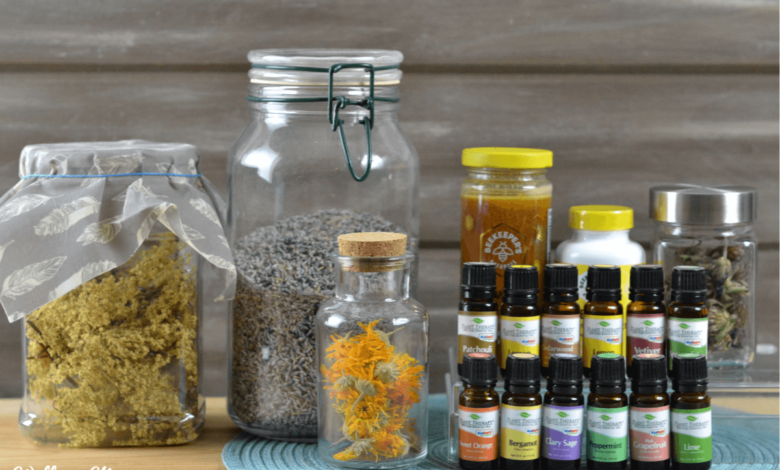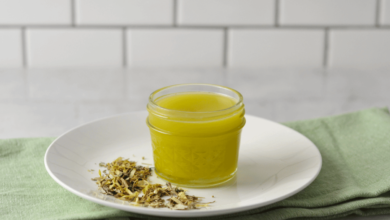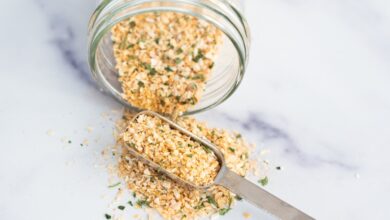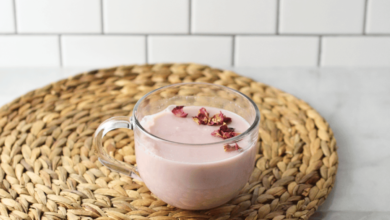
How To Store And Organize Your Natural Remedies
[ad_1]
Table of Contents[Hide][Show]
Herbal remedies are something I always have on hand for whatever life brings. They won’t do me much good, though, if I can’t find what I need when I need it! Here’s how to store and organize your natural remedies, herbs, and more.
Contents
How to Store Your Natural Remedies
As my natural remedies started to overtake conventional ones, my stash grew and grew. I’m pretty proud of my natural medicine cabinet, but it does take some maintenance. No one wants to find a forgotten, rancid salve at the bottom of a pile.
By keeping my herbal medicine organized, I can be sure to not only find what I need but not waste what I have.
If you’ve ever heard of the KonMari method (or even if you haven’t), it can apply to organizing and storing natural remedies, too. It doesn’t mean we have to store things in a specific way, but some of the general principles are the same.
- Declutter and get rid of unneeded natural remedies
- Clean out and arrange items by groups
- Organize what’s left
Unlike the strict Marie Kondo method, I’m not thanking my rancid salve before throwing it out, though. And my cough syrup may not spark joy, but it’s still useful and necessary. First things first, let’s talk about cleaning out our home remedies.
Gather it All Together
It’s hard to organize what you can’t see or don’t know you have. I suggest gathering up all of your dietary supplements, herbs, essential oils, and natural remedies in one place, like the kitchen table. This way, you can easily lay it all out and see what’s there and how it will fit in the space.
Discard any items that are expired or no longer fresh. Here’s a quick guide to the shelf life of certain natural remedies:
- Dried herbs: More delicate herbs, like chamomile flowers, will last for 1-2 years. Powdered herbs lose potency faster and last 6-12 months. Roots and bark (like echinacea root) can last longer, about 2-3 years. Just because an herb is older doesn’t necessarily mean it’s lost its potency. If the plant material has good color and a good scent, it’s still useful, though maybe not as potent.
- Fresh herbs: These will only last about one week maximum in the fridge. Either use fresh medicinal herbs right away or dry them.
- Glycerites: Tinctures made with glycerine, called glycerites, will last about one year.
- Tinctures: Alcohol tinctures with a high alcohol content will last 2-5 years.
- Essential oils: Citrus oils oxidize faster and only last for about 1-2 years. Thicker, base note oils typically last longer (up to 8 years) and can even improve with age, like vetiver, patchouli, and myrrh. Here’s a handy chart from Plant Therapy with general essential oil shelf life recommendations.
- Salves and creams: It depends on the ingredients and if you used a preservative or something to slow oxidation (like vitamin E oil). Generally, DIY salves will last for six months to 3 years. If it’s starting to separate, or looks or smells off in any way, be safe and pitch it.
- Supplements, homeopathic remedies, and vitamins: Refer to the expiration date on the bottle as this varies.
- Store water-based ingredients in the fridge and use them within a week or so. This includes homemade lotion or after sun spray. If you’re using a natural antimicrobial preservative, creams and lotions will last a little longer on the shelf.
Finding a Place to Store Your Natural Remedies
We want our remedies to be in an area that’s easy to access and makes sense for what we’re using them for. Essential oils for the bedroom diffuser can go on the dresser. I keep magnesium oil and lotion bars in my nightstand for when it’s time to wind down at night.
Convenience is one thing, but we also have to consider storage conditions. Natural remedies aren’t the same as FDA-approved prescription drugs, and they need to be treated with special care. Herbs and essential oils should be stored in a cool, dark place, away from direct light and heat. The health benefits of these healing herbs degrade if they’re not stored well.
Here are some places where it is NOT recommended to store natural remedies:
- Above or right next to appliances that put off heat and moisture, like the stove, dishwasher, or refrigerator. That tiny cabinet above the stove is not the right place for herbs!
- In the bathroom or next to the shower. Bathrooms can get really steamy and warm and don’t mix well with certain natural remedies.
- Where little ones can reach them. While I’m not going to freak out if a toddler gets into the dried peppermint, certain natural health items (like essential oils) need to be kept out of reach of curious little hands.
With these parameters in mind, just find what makes sense for your family. Maybe that’s a bookshelf, a free-standing cabinet, or a kitchen cupboard (or 3!). Even if they’re not all going to be stored in the same place, pick areas and containers that will fit the different items in your home apothecary.
Make Sure to Label Everything
Regular supplements and vitamins already come with labels, but homemade items are a different story. It’s important to date and label everything, so we know what it is. You may think you’ll remember that a sleep tincture was in that bottle, but as you collect more items, it can quickly get confusing if herbal products aren’t labeled.
- Write down the name of the herb and when you purchased or harvested it.
- List out the ingredients and the date you made the herbal remedy for salves, mixed tinctures, blended teas, etc.
- Masking tape or address labels are both good options. Masking tape is generally easier to remove if you want to reuse and relabel the container for next time.
Time to Organize Your Natural Remedies
Once you’ve found a place to put your natural remedies and discarded what’s bad, it’s time to start organizing. You can group items by what you use the most, do it alphabetically, or put all similar items together (like all the dried herbs in one spot). If certain family members have their own products, you could group things that way too.
Containers for Organizing Natural Remedies
There are a lot of different options, and it doesn’t have to be expensive. It’s always best to store herbs, essential oils, and tinctures in glass bottles for the best shelf life. Mason jars, weck jars, or even reused glass food jars will work. If you want to store dried herbs in the bags they came in, arrange them upright in a row in a small bin.
- Tiered shelves are a good use of space so you can see what’s in the back rows. Supplements, vitamins, tinctures, and essential oil bottles work well on tiered shelves.
- Organizing containers, like these plastic bins, are good for drawers.
- Homeopathy bottles are lightweight and tend to fall everywhere in my cabinet, so I like to corral those into their own small bin.
- Be sure to store tincture bottles and essential oils in an upright position so they don’t leak. The rubber on the top of tincture dropper bottles will start to degrade over time. An easy solution is to remove the dropper top and replace it with a screw-top lid for tinctures that will be sitting around for a while.
Put what you use the most (like daily vitamins) in the front or the most convenient spaces. Items that I don’t use as much go to the back. Something like this syrup for dry coughs is super convenient when I need it, but my kids don’t have a sore throat every day. When I want to boost our immune systems during the winter months, I’ll make sure our elderberry is easy to grab.
What types of natural remedies do you keep on hand? How do you store them? Leave us a comment, and be sure to share this post with a friend!
[ad_2]





